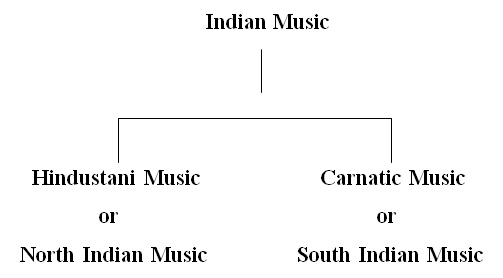 |
| Subject Expert |
: |
|
Dr. Gurnam Singh,
Professor, Department of Gurmat Sangeet
Punjabi University, Patiala
S. Amrinder Singh, Department of Gurmat
Punjabi University, Patiala |
| Translator |
|
|
Ms. Amanjot Kaur |
|
 |
| |
|
|
| |
Music can be defined as a melodious sound which soothes the mind. The Vocal, Instrumental and Dance tradition of Indian tradition have Developed Independently. These are complementary to each other in practice.
1. Vocal
In Indian music, singing holds a prominent position. Under this Vocal tradition apart from classics, there is a vast tradition of Cultural folk singing, religious singing, film music and light music are prevalent in Indian Vocal tradition. and light music are prevalent in Indian Vocal tradition. 
2. Instrumental
Indian music holds the tradition of Instrumental music on the basis of various musical and rhythmic percussion instruments. This tradition of instrumental music has developed as an independent art form in the present times. The instrumental music also has a significant tradition of Indian Orchestra (Varindvadan) 
3. Dance
Like vocal and musical forms of art, dance has also its own prevalent developed form. In the Indian classical dances, Bhart Natyam , Khathak , Khathak , Kathakali, Manipuri , Kathakali, Manipuri , Odisi , Odisi , Kuchipudi , Kuchipudi etc. are the major forms. In all these three types, the various movements and expressions with artistic postures of body are accompanied with suitable melody and rhythm. etc. are the major forms. In all these three types, the various movements and expressions with artistic postures of body are accompanied with suitable melody and rhythm.
Indian Music
A complete music tradition sung and played in India - a country in Asian continent  is called Indian Music. It has a very rich heritage. It comprises of classical music, which is based on the ancient music and musicology (Sangeet Shastar) developed by the Indian musicologists. Regional folk music is called Indian Music. It has a very rich heritage. It comprises of classical music, which is based on the ancient music and musicology (Sangeet Shastar) developed by the Indian musicologists. Regional folk music  (Lok Sangeet) (Lok Sangeet) and all other streams of music are integral part of this tradition. Indian music has two systems of music : 1. Hindustani Music Tradition (North Indian Music), 2. Carnatic Music Tradition (South Indian Music) and all other streams of music are integral part of this tradition. Indian music has two systems of music : 1. Hindustani Music Tradition (North Indian Music), 2. Carnatic Music Tradition (South Indian Music)  |
|
| |
|
|
| |
 |
|
| |
|
|
| |
Hindustani Music Tradition
A part from Madras, Mysore and Andhra Pradesh states of Southern India, the music tradition prevalent in the rest of Indian regions is called Hindustani music tradition  . The Gurmat Sangeet . The Gurmat Sangeet  , sufi music , sufi music  , folk music and film music , folk music and film music  traditions are also a part of this music system. traditions are also a part of this music system.
Carnatic Music Tradition
The music lore prevalent in the southern part of India including the states Madras, Mysore, Andhra Pradesh is called Carnatic Music tradition. It is also known by the name of Southern music tradition as it is prevalent in the Southern Part of India.  The common forms in vogue are Kirtan The common forms in vogue are Kirtan , Kirti , Kirti , Varnam , Varnam Singing styles of classical music. Singing styles of classical music. |
|
| |
|
|
|
| |
|
|
| |
1. Desi Sangeet  |
: |
Music rooted in a region related to common masses. |
| 2. Gurmat Sangeet |
: |
A tradition of Shabad kirtan Founded by Sikh Guru
follwing the musicology of Guru Granth Sahib. |
|
|
|
| |
|
|
| |
1. The Indian Music tradition in Divided in into which two forms
I. Gazal and Tappa II. Hindustani and Carnatic Music
III. Khial and Thumri IV. Dhrupad and Dhamar
2. What is the music based of Classics Called ?
I. Film Music II. Folk Music
III. Classical Music IV. Southern Music.
3. Which of following Presents the Combination of Music.
I. Gayan-Vadan-Narit
II. Dhrupad-Dhamar-Tappa
III. Sufi Music-Light Music- Classical Music
IV. Western Music-Classical Music-Pop Music
4. Music can be defined as.
I. Melodious Sound II. Any Sound
III. Low Voice IV. None of the above
5. Which of the following holds a prominent position in Indian music.
I. western II. Instrumental
III. Dance IV. Vocal
6. Which of the following is the major form of Indian Classical Dance.
I. Bharat Natyam II. Kathak
III. Kathakali IV. All the above
7. Which two Catagouries belong to Indian music Tradition.
I. East Indian Music - West Indian Music
II. North Indian Music - South Indian Music
III. None of the above
IV. Both (a) and (b)
8. Gurmat Sangeet belongs to which of which of the following.
I. Hindustani Music Tradation
II. Carnatic Music
III. South Indian Music
IV. All the Above.
9. Hindustani Music Tradition includers.
I. Sufi music II. Western Music III. Varnam IV. All the above
10.Carnatic Music Tradition belongs to which regious.
I. Madras, Maysore and Andhra Pradesh
II. Punjab, Haryana and Rajsthan
III. Patiala, Ropar,Bathianda.
IV. None of above |
|
| |
|
|
| |
 |
|
| |
|
|
| |
|
|
| |
|
|
|
| |
|
|
| |
1. Dictionary of Music, Eric Blom, Bhartiya Kala Prakashan, Delhi, 2007
2. Encyclopaedic Dictionary of Music, Vol 1-2, Ashish Pandey (Edi.), Isha Books, Delhi, 2005.
3. Gurmat Sangeet Terminolgy, Gurnam Singh (Dr.), (Chief Edi.), Pujnabi University, Patiala. 2012
4. The Oxford Encyclopaedia of Music of India, Vol I-III, Late Pt. Nikhil Ghosh (Chief Edi.), Oxford University press, New York, 2011.
|
|
| |
|
|
|




